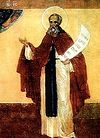

| Previous day | Next day |
| Old Style
February 13
|
Tuesday |
New Style
February 26
|
| Tone 6. | No fast.
|
![]() St. Martinian, monk, of Caesarea in Palestine (5th c.), and Sts. Zoe of Bethlehem and the virgin Photina (5th c.). Archbishop Seraphim (Sobolev) of Bogucharsk, Bulgaria (1950).
St. Martinian, monk, of Caesarea in Palestine (5th c.), and Sts. Zoe of Bethlehem and the virgin Photina (5th c.). Archbishop Seraphim (Sobolev) of Bogucharsk, Bulgaria (1950).
St. Eulogius, patriarch of Alexandria (607-608). St. Symeon the Myrrh-gusher, prince of Serbia (1200). Synaxis of the Saints of Omsk. St. Joseph, founder of Volokolamsk (Volotsk) Monastery (1515).
New Hieromartyr Sylvester (Olshevsky), archbishop of Omsk (1920). New Hieromartyrs Leontius Grimalsky, archpriest, of Gzhel (Moscow) and Zosima Trubachev, archpriest, of Maloyaroslavets (1938).
Apostle Aquila of the Seventy, and St. Priscilla (1st c.) St. Timothy, archbishop of Alexandria (385). St. Castor of Karden, hieromonk and missionary (Germany) (ca. 400). St. Modomnoc, bishop of Ossory (Ireland) (6th c.).
Repose of Abbess Seraphima of Sezenovo (1877).
Thoughts for Each Day of the Year
According to the Daily Church Readings from the Word of God
By St. Theophan the Recluse

Tuesday. [I John 3:11–20; Mark 14:10–42]
Saint Peter so enthusiastically insisted that he would not reject the Lord; but when it came down to it, he denied Him, and three times no less. Such is our weakness! Do not rely upon yourself, and when you enter into the midst of enemies, place all your hope to overcome them on the Lord. For this purpose such a fall was allowed to such a great person—so that afterwards nobody would dare on his own to do something good or to overcome some enemy, either inner or outer. You must hope in the Lord, but not stop trying. Help from the Lord joins our efforts, and thus makes them powerful. If these efforts are not there, God’s help has nowhere to descend, and it will not descend. But again, if you are filled with self-reliance, and consequently you have no need for help and seek no help—again, God’s help will not descend. How is it to descend when it is considered unnecessary?! Neither, in this case, is there anything with which to receive it. It is received by the heart. The heart opens up to receive through a feeling of need. So both the former and the latter are needed. Say, “Help, O God!” But don’t just lie around.
Articles
 Venerable Martinian of Caesarea, in PalestineSaint Martinian went to live in the wilderness at the age of eighteen, not far from the city of Caesarea in Palestine. |
 St. ZoeSaint Zoe remained on the island, where she spent six years in solitude, and then she gave up her soul to God. |
 St. PhotinaSaint Photina remained on the island, where she spent six years in solitude, and then she gave up her soul to God. |
 St. Eulogius the Archbishop of AlexandriaSaint Eulogius, Patriarch of Alexandria, was one of the enlightened hierarchs of the sixth century. |






